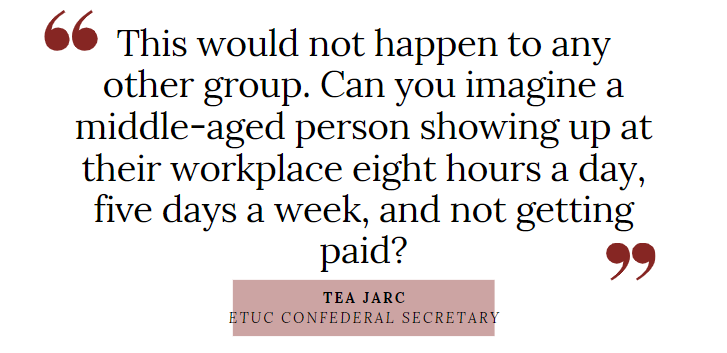In 2023, nearly half of interns (45%) were unpaid and 67% didn't have full access to social protection, according to the latest data. Unions are now pushing for a law banning unpaid internships across the EU, before the upcoming elections "shake everything up again".
Although the European Parliament voted to ban the practice in June 2023 and a directive was supposed to be published this January, it has already been postponed twice. Unions now fear that it will not be published in time for the June elections.
"It was completely wiped from the European Commission's agenda. The fate of the directive is very uncertain right now," European Trade Union Confederation (ETUC) Confederal Secretary Tea Jarc told The Brussels Times.
On Monday, the ETUC sent an open letter to European Commission President Ursula von der Leyen, denouncing the delays. "The EU needs to take action to make traineeships empowering not exploitative. Blocking access to career opportunities for young people based on their family's ability to fund extended periods of unpaid work is a stain on Europe's aspiration to equal opportunity."
'Unreasonable burden'
Last year, a study by the European Youth Forum showed that unpaid internships cost an average young person in Europe over €1,000 per month (and in Belgium, even up to €1,300 per month), highlighting how this practice disadvantages those from lower socio-economic backgrounds.
While the European institutions all agree that unpaid internships are exploitative, no real steps have been taken to ban them, stressed Jarc. This is partly due to pressure from employers, who have stated that paying interns would increase labour costs.
"But paying people for their work cannot be seen as an unreasonable burden or 'cost of the initiative' and even less as a reason to not move forward with the directive," Jarc said. "Fair remuneration is the price for respecting human rights, labour rights, and workers' rights."

Credit: Flipsnack
The ETUC is now pushing the Commission to come up with a qualitative proposal to ban the practice before the elections in June. "It has to happen now, before the upcoming European elections shake everything up again: time is running out. We want the EU to act within this mandate and ban this practice once and for all."
She also called the institutions "very hypocritical" for not having done it already. "All the EU institutions are currently calling on young people to vote and to attend the elections, yet it seems that they are de-prioritising young people's issues," Jarc said, adding that the ETUC will not compromise on their demands just because of time pressure.
In 2022, the European Committee of Social Rights ordered Belgium to ban unpaid internships, calling the practice "discriminatory and unfair." While the country was ordered to take steps, Jarc says that not much has changed.
This is partly why the ETUC is calling for a binding legislative directive – not just a council recommendation – to address a number of issues.
"Firstly, we need to identify what internships are and how they differ from entry-level jobs," she said, adding that the former requires supervision and guidance. "We must also address remuneration and stress that it has to be in line with the minimum wage directive – they cannot be paid something symbolic with which they cannot pay their bills."
Secondly, the ETUC is focusing on social protection, so the health insurance of interns and trainees is covered and they are eligible for benefits in case of unemployment, for example. "There should also be limits on working hours: they should not be expected to work overtime."
Lastly, regulations should be in place to ensure that people are not exploited through continuous internships. "When companies put out an ad for an internship, they should not be looking for someone with work experience or previous internship experience."
Age-based discrimination
"Weirdly, this kind of practice is only accepted when talking about young people," she added. "This would not happen to any other group. Can you imagine a middle-aged person showing up at their workplace eight hours a day, five days a week, and not getting paid? But because interns are young people, it is somehow acceptable. Pure discrimination based on age."
While the latest Eurobarometer data shows that Belgium is still the worst in Europe for paying interns (just 39% of respondents were paid or offered financial compensation for their last traineeship), this figure has doubled since 2021. This demonstrates that the actions taken by Federal Minister for Work and Economy Pierre-Yves Dermagne in February 2022 have had an impact.
Last year, Dermagne took further action on the issue and sought advice from the National Labour Council on preventing sham internships, spokesperson Laurens Teerlick told The Brussels Times. "Following up on that advice, Minister Dermagne wrote to his Flemish colleague Jo Brouns in January, asking for a solution to the lack of control possibility by Flemish regulations."
Related News
- European Parliament votes to ban unpaid internships across EU
- ‘Ramen noodles only’: Unpaid internships cost young people over €1,000/month
- 'Abuse of young workers': Belgium ordered to ban unpaid internships
In its report, the Council reiterated that the current inspection system is inadequate because it "relies solely on individual complaints from interns and trainees". It does not take other proactive measures that take into account the vulnerability of the target group to effectively ensure that traineeships are not used to replace regular workers.
They also stressed the importance of monitoring bogus internships at a national level, as well as cooperation between federal and regional inspection services.
"In any case, this exploitation cannot continue any longer," said Jarc. "We are very concerned. We will have to wait for the actual proposal, but as it stands, things do not look good for young people in Europe."


